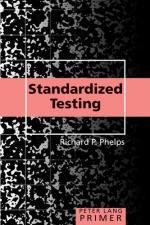|
This section contains 140 words (approx. 1 page at 300 words per page) |
A feature of test scoring where a student's test scores are compared to others.
Educational age is one measure of how a student's score on a standardized test compares to others in various chronological age categories. Education age is a type of norm used in achievement tests or other types of tests. For example, a group of six-year-olds may be given a standardized test. Each student will receive an individual score, which can then be compared to a table of scores linked to ages. Some children's scores may correlate with scores of children younger, others with children who are older. Thus, a child may be six years, five months old, and have an educational age (as measured by one test) of six years, zero months. Alternatively, a six-year-old's educational age may be seven years, six months.
|
This section contains 140 words (approx. 1 page at 300 words per page) |


